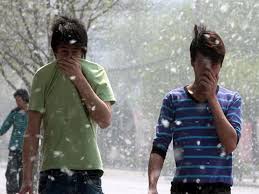 Even as freaky weather conditions continue, the Kashmir region is grappling with pollen-induced allergy, which is now turning into a seasonal phenomenon.
Even as freaky weather conditions continue, the Kashmir region is grappling with pollen-induced allergy, which is now turning into a seasonal phenomenon.
The common symptoms of pollen-induced allergy include nasal irritation, running nose and red and watery eyes, which may further exacerbate if proper medical advice is not sought by the affected persons.
Being the spring season, most of the tree varieties, including apple trees in the hinterland across Kashmir, are currently in the pollination phase and are also roving a health hazard by inducing seasonal pollen allergies.
Though pollen allergies in temperate regions like Kashmir are a common feature in the spring season but the allergies induced by the pollen from exotic poplar varieties, like the ones imported from Russia, Australia and the US, has turned out to be a perennial health hazard in Srinagar.
“The pollen from the poplar trees, which hover in air in the form of cotton, is proving to be a nuisance. My children have got the pollen allergy and they are constantly sneezing,” said Imtiyaz Ahmad, a resident from the Rawalpora locality of Srinagar.
Populus deltoides, a female variety of these exotic poplar trees, has been identified by the experts as the common agent which produces pollen with a lot of cotton and is responsible for the allergy.
In fact, in 2015, this health hazard also invited attention of the High Court which had in May that year passed directions banning plantation and trade of pollen-producing exotic varieties of poplar trees across Kashmir, particularly the Russian poplar. Subsequently, the divisional administration had also issued orders for cutting down the exotic Russian variety of poplar trees.
Since then, thousands of poplar trees belonging to the particular variety have been cut in the city as well as in Kashmir, but this season, the cotton dust is back in the air.
“The most common and visible symptoms of pollen allergy are nasal irritation or burning, redness or watery eyes or rashes on skin,” said Dr Adil Asharf of Shri Maharaja Hari Singh Hospital in Srinagar.
The health experts describe the pollen-induced allergy as a seasonal health hazard, warning that the condition may get exacerbated in patients with asthma. They advise that people prone to pollen allergies should wear masks and avoid direct contact with pollen or dust.
Pollen-induced allergy hits Kashmir valley




